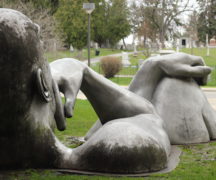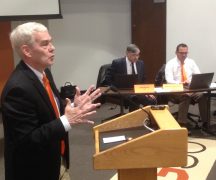By DAVID DUPONT
BG Independent News
The BGSU Faculty Senate Tuesday approved a resolution opposing a bill now making its way through the legislature that would impose major changes in how public higher education operates in the state.
Senate Bill 83 was put forward in March by State Senator Jerry Cirino (R-Kirtland).
The bill:
Restricts the teaching of controversial topics.
- Bans diversity, equity initiatives.
- Forbids relationships with Chinese colleges.
- Prohibits policies that “segregate” people based on gender identity.
- Forbids strikes by unionized workers.
- Changes how tenure is granted.
According to a news report from WEWS in Cleveland, and shared by Ohio Capital Journal, Cirino told a news conference in March when he unveiled the measure that it will “ensure Ohio’s students are educated by means of free, open and rigorous intellectual inquiry to seek the truth.”
David Jackson, a professor of political science and the president of the BGSU Faculty Association, described the bill as “a laundry list of changes to higher education” reflecting the views of those who ascribe to certain ideology.
The language is so vague that questions about whether it would do away with men’s and women’s sports teams or even rest rooms are reasonable, he said.
The senate bill “is a one size fits all solution in search of problems” covering 14 independent state universities all of which have different policies, principles, and governance models.
The faculty resolution, which passed 36-4, concludes: “SB 83 represents a political takeover of higher education that will deprive our students of a top-quality education; deprive Ohio businesses and industries of well-educated workers; add undue financial burdens to the universities through added administrative compliance reporting and other costs, and make our state a less-desirable place in which to live and work(.)”
After a recent hearing in which opponents testified for 14-hours, Cirino indicated that there would be wording changes. No votes have been taken yet on SB 83. It remains in the Workforce and Higher Education Committee.
Provost Joe Whitehead said that his understanding was there would be one amended bill, not a series of amendments. The provost reported President Rodney Rogers was in Columbus working with the Inter-University Council to amend the bill.
Jackson said the Council’s approach was to modify the legislation while the Ohio Conference of the American Association of University Professors wants to kill the bill in the legislature. Both approaches, he said, “are reasonable.”
Jackson said opponents should not count on Gov. Mike DeWine vetoing the measure.
A verbatim version of the senate bill has been introduced in the House (HB 151). Jackson said it is expected that Cirino will soon introduce the amended version. That complicates the measure’s passage through the legislature since difference in the two bills would have to be sorted out.
Jackson, the initial author of the faculty resolution, said it was crafted to tie objections to the legislation to the university’s collective bargaining agreement, charter, and strategic plan.
The resolution is “a very Bowling Green-centric response to this legislation linking the criticisms to the central guiding documents collaboratively produced” on campus.
Below is the full text of the resolution:
| A Resolution of the Bowling Green State University Faculty Senate Issues with the Senate Bill 83 as proposed Presented on: April 25, 2023 By: David Jackson On behalf of: BGSU Senate Committee on Professional Affairs Whereas the BGSU Academic Charterstates: Essential to the atmosphere of a University is academic freedom, the full freedom of speech, freedom to teach, to learn, and to conduct inquiry in a spirit of openness necessary to the acceptance of criticism, the expression of differing opinions, and the pursuit of truth. The exercise of academic freedom by faculty and students carries with it responsibilities for the good of the academic community and society. The (faculty have the) responsibility to assure the student’s freedom to learn, through maintaining an atmosphere conducive to free inquiry, the respect of the student as an individual, and the evaluation of students based on professionally judged academic performance without regard to personal or political matters irrelevant to that performance. The (faculty have the) responsibility to exercise intellectual honesty, through the development and improvement of one’s scholarly competence, the exercise of critical self-discipline and judgment, and the avoidance of subsidiary interests that compromise or hamper freedom of inquiry. and Whereas The BGSU Strategic Plan Foundational Objective #III: Promoting Public Good Through Our People and Community: Initiative 9: Culture of inclusion, respect and curiosity, states: “We will create the culture that we aspire to be by intentionally educating all members of our community regarding diversity, inclusion and democracy. This will allow us to recruit, retain and support a diverse community of students, faculty and staff so that all belong.” and Whereas the Collective Bargaining Agreement between BGSU and the BGSU Faculty Association states: Bargaining Unit Faculty Members shall be free to apply their expertise, consistent with the standards of their disciplines and the standards of the community of scholars. BUFMs are entitled to freedom in the classroom (including the virtual classroom) in choosing course content and discussing and presenting their subjects in accordance with department/school or program approved curricula. Faculty must state clearly the objectives of the courses or subjects taught, provide constructive and timely feedback, and make an effort to ensure the curricular objectives are met. Controversy is at the heart of free academic inquiry, but faculty members should be careful not to introduce into their teaching controversial matter which has no relation to their subject As teachers, BUFMs shall encourage the free pursuit of learning in their students. BUFMs shall demonstrate respect for students as individuals and adhere to their proper roles as intellectual guides and mentors. and Whereas SB 83 Requires state institutions to adopt a policy requiring the institution to prohibit mandatory Diversity, Equity, and Inclusion programs/training; and Whereas SB 83 requires universities to affirm and guarantee that faculty and staff shall allow and encourage students to reach their own conclusions about all controversial matters and shall not seek to inculcate any social, political, or religious point of view, and defines controversial matters as any belief or policy that is the subject of political controversy, including issues such as climate change, electoral politics, foreign policy, diversity, equity, and inclusion programs, immigration policy, marriage, or abortion; and Whereas the ambiguous language above will have a chilling effect on students’ rights to learn about these controversial subjects; and Whereas SB 83 requires the Chancellor of Higher Education to develop a minimum set of standard questions for state institutions to use in student evaluation of faculty. The questions must include this quadruple-barreled question: “Does the faculty member create a classroom atmosphere free of political, racial, gender, and religious bias?”; and Whereas SB 83 attacks academic freedom as protected by tenure, which traditionally includes rigorous review and expectations of faculty; and Whereas SB 83 creates a faculty evaluation process void of faculty involvement and due process, contrary to both the Academic Charter and the CBA; and Whereas SB 83 seeks to dismantle diversity on our campuses and in our workplaces and prohibits diversity, equity, and inclusion initiatives and training; and Whereas SB 83 prohibits Ohio universities from entering any academic relationship with an academic institution located in China or an academic institution that is located in another country and is associated with the People’s Republic of China; and Whereas SB 83 prohibits training on concepts related to being advantaged or disadvantaged based on race and sex; prohibits hiring employees to provide instruction on these concepts and, requires institutions to implement a range of disciplinary sanctions for anyone who authorizes or engages in such training, contrary to the provisions of the Academic Charter and Strategic Plan; and Whereas SB 83 prohibits policies designed explicitly to segregate faculty, staff, or students by group identities such as race, sex, gender identity, or gender expression, including in orientations, majors, financial awards, residential housing, administrative employment, faculty employment, student training, extracurricular activities, and graduations, and Whereas SB83 is written in such a way as to be open to multiple interpretations, such as the unintended prohibition of majors such as Ethnic Studies, Asian Studies, Women’s and Gender Studies, prohibition of the Black Student Union, Latino Student Union and other affinity groups whose utility to the academic mission of the University is well-researched and documented, elimination of single-sex restrooms as well as single-sex intercollegiate and intramural athletics, and potential hindrance of and curtailment or closure of multiple student support services; and Whereas SB 83 eliminates the ability of university employees to strike as part of collective bargaining, thereby stacking the deck against workers in the State of Ohio; and Whereas SB 83 represents a political takeover of higher education that will deprive our students of a top- quality education; deprive Ohio businesses and industries of well-educated workers; add undue financial burdens to the universities through added administrative compliance reporting and other costs, and make our state a less-desirable place in which to live and work; and Whereas the legislative process surrounding the development of the language of SB83 and other bills addressing higher education appears to lack substantive perspective from higher education stakeholders. THEREFORE: Be it resolved that without engaged discussion and collaboration with higher education practitioners and stakeholders, the Faculty Senate of BGSU opposes SB83 and encourages legislators to vote no on the bill, and if it should pass encourages the Governor to veto it. |





